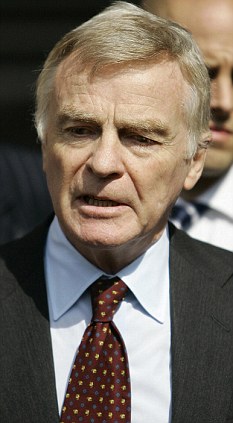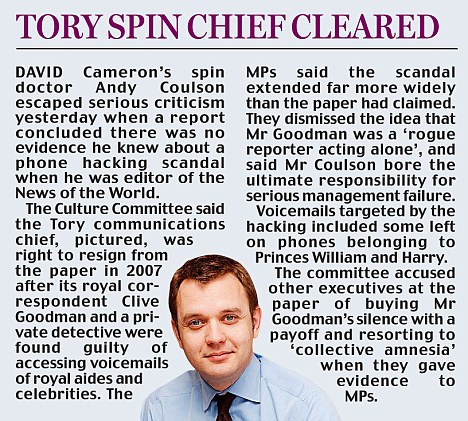 |
|
Damages: Max Mosley |
MPs will today demand a crackdown on 'chilling' libel and privacy
laws, warning that freedom of speech is under fire from the courts.
In a hard-hitting report, the Commons Culture, Media and Sport
Committee expresses 'deep concern' that the freedom of the Press to
expose wrongdoing and report on Parliament has been eroded by privacy
clauses in the Human Rights Act.
However, it also says the self-regulation of the newspaper
industry through the Press Complaints Commission does not always work.
The committee particularly criticises the PCC for failing to hold
a proper investigation over 'false and damaging' newspaper coverage of
the disappearance of
Madeleine McCann.
'In any other industry suffering such a collective breakdown ...
any regulator worth its salt would have instigated an inquiry,' the
report says, adding that newspaper industry is 'in denial about the
scale and gravity of what went wrong'.
In their far-reaching report the MPs:
-
Express concern about the use of 'super-injunctions' -
often by celebrities such as footballer John Terry - which
even ban the reporting of the fact that they exist;
-
Call for urgent changes to the huge fees libel lawyers
charge;
-
Demand action to stop foreign litigants coming to the UK
to launch
libel cases in Britain's more amenable courts;
-
Criticise the Press Complaints Commission as 'lacking
credibility' and say it should be able to fine papers and
ban them from publishing for a day;
-
Say papers must put allegations to those they are writing
about in advance of publication.
|
The MPs also take aim at the way Britain has the friendliest
courts for those who want to sue for libel and say action is required to
' correct the balance which has tipped too far in favour of the
plaintiff'.
The committee brands it 'a humiliation' for the British legal
system that U.S. states have been forced to pass their own legislation
'to protect freedom of speech from what are seen as unreasonable
incursions by our courts'.
At a press conference to discuss the report, Labour committee
member Paul Farrelly warned: 'Certain judges are operating a one-man
libel industry.'
The committee reserves some of its strongest criticism for the
way oil company Trafigura tried to use a super-injunction to prevent the
reporting of Commons debate on its dumping of toxic waste.
The MPs demand a new law to make clear that the Press can report
what they like from Parliament, calling it a 'cornerstone of a
democracy'.
The report concludes: 'We strongly urge that a way is found to
limit the use of super-injunctions as far as is possible and to make
clear that they are not intended to fetter the fundamental rights of the
Press to report the proceedings of Parliament.'
The report follows a two-year investigation. At its centre was
the way the Human Rights Act has been used by celebrities such as
Formula One boss Max Mosley to seek damages over stories or block
publication with injunctions.
The report dismisses widespread criticism of judges like Lord
Justice Eady for using the Human Rights Act to usher in privacy laws via
the back door.
But the MPs say the safeguards put in place by Parliament have
not worked.
They call on the Ministry of Justice to set up an urgent
investigation into the operation of Section 12 of the Human Rights Act,
meant to balance freedom of expression with the right to privacy.
The MPs demand 'urgent' new measures to curb the huge payouts to
libel lawyers which have deterred newspapers from investigative
journalism likely to upset the rich and powerful.
The committee also calls for tougher regulation of the media,
saying the PCC is 'widely viewed as lacking credibility and authority'.
It says the body should initiate inquiries before a complaint is
received and the PCC code should be rewritten 'to include a requirement
that journalists should normally notify the subject of their articles
prior to publication - unless there is a strong public interest not to'.
It is already common practice, although not universal, for
newspapers to offer the right of reply to people they plan to write
about.
PCC director Stephen Abell said last night: 'The role of
maintaining Press standards is vitally important, and the Commission
will consider, in light of this report, how it can most appropriately
improve.' |




